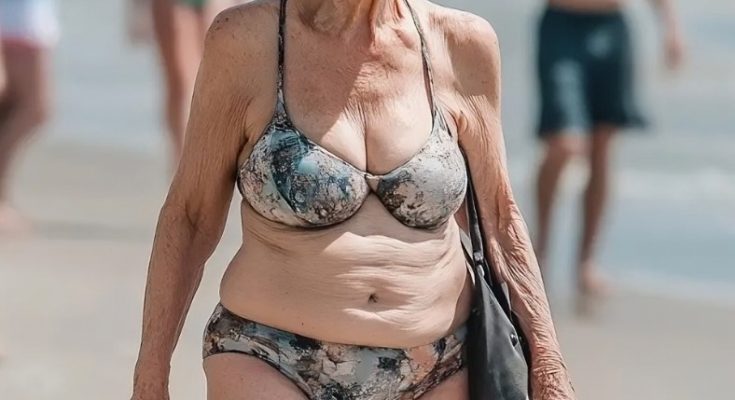Women – don’t get larger, don’t get older, don’t have fun, don’t dare to wear a bikini

Every summer, like clockwork, the media lights up with images of women on holiday, with every detail scrutinized under the sun. Are they in bikinis? Are they too old, too big, or too comfortable in their skin? Cue the uninvited commentary: “Why is she wearing a bikini at that age?” or “Shouldn’t she be in a one-piece?” Unfortunately, this ritual has become a hallmark of the season. From paparazzi shots to scathing headlines, this relentless shaming perpetuates an unrealistic standard. But why is this the norm, and what does it say about society’s relationship with women’s bodies?
The Annual Spectacle of Body Shaming

Let’s call it what it is: a spectacle. During the summer months, certain media outlets seem to relish the chance to parade images of female celebrities in swimsuits. These aren’t just photos; they’re ammunition. Paparazzi snap these women in vulnerable moments—adjusting a towel, stretching, or bending over—and they’re often captured from unflattering angles to amplify imperfections. If the perfect shot isn’t there, the right lens and a bit of editing can make it look like it is.
But why? Why do these images gain so much traction, and why is there such a public appetite for seeing women, particularly those who dare to age or exist above a size eight, ridiculed for simply living their lives?
Why Women’s Swimwear Choices Are Everyone’s Business
Women’s bodies have long been considered public property. When a famous woman steps out in a bikini, her body is dissected for the world to see. It’s not about the fashion statement; it’s about sending a message. There’s a lingering expectation that women must adhere to a certain body type and age gracefully—if at all. Deviating from these unspoken rules means opening oneself up to ridicule and criticism.
The Pressure of “Bikini-Ready” Bodies
Every summer, we hear about achieving that elusive “bikini body.” The implication is clear: only certain bodies are worthy of wearing a bikini, and if you don’t fit that mold, you should cover up. This fixation on the “bikini body” has led to an entire industry of fad diets, intense workout regimens, and wellness products marketed specifically toward women. The undercurrent here is that women must continually work to meet society’s physical standards, or else risk being deemed “unworthy” of participating in summer fun.
Age and the Bikini Double Standard
While the summer takedown photo-dump does occasionally feature men, the focus is overwhelmingly on women. Older male celebrities in swim trunks rarely face the same vitriol. A male celebrity can go gray, gain weight, or show signs of aging, and it’s largely accepted, even celebrated. But if a woman dares to age, especially in a bikini, the narrative shifts. The British media has a peculiar way of showcasing these women under the guise of admiration while subtly (or not-so-subtly) encouraging readers to sneer.
The Role of Paparazzi: Turning Innocent Moments into Public Shame
The role of the paparazzi in this bizarre ritual can’t be understated. Their long lenses don’t seek out glamor; they search for the ordinary moments that humanize these celebrities, catching them in the act of simply existing. This creates a spectacle that people are compelled to react to, sparking conversations across social media, tabloids, and beyond.
Capturing Women in Vulnerable Moments
These photos are specifically designed to be unflattering. A woman bending to apply sunscreen or sitting without considering her posture becomes a punchline. Society has turned beach activities into opportunities for humiliation, as if a woman relaxing on holiday has somehow invited the world’s criticism simply by being less than “camera-ready.”
Public Humiliation as Entertainment

The troubling aspect of this annual shaming spectacle is that it seems to entertain people. There’s an underlying cruelty that society has become desensitized to. This cycle of “shock, shame, and share” has made it acceptable to treat women’s bodies as fodder for entertainment, judging them mercilessly while ignoring the impact this has on the very real individuals involved.
The Psychological Impact of Body Shaming
Studies have shown that exposure to body-shaming messages can significantly impact mental health, leading to lower self-esteem and body dissatisfaction. This doesn’t just affect celebrities but extends to all women. When the media sets a standard that only a narrow range of bodies can confidently wear a bikini, it reinforces a damaging message. Many women internalize these unrealistic expectations, leading to feelings of inadequacy and self-consciousness, even in private settings.
A History of Body Policing in the Media
Body shaming is not a new phenomenon, but its evolution has grown insidiously. From tabloid culture to today’s viral social media posts, the idea that a woman must look a certain way to be respected remains alarmingly prevalent. In past decades, magazines were the culprits, using airbrushing and Photoshop to present an unattainable ideal. Nowadays, it’s the “candid” beach shots that deliver the same hurtful messages. We’ve traded one form of unrealistic beauty for another, with traditional media and social platforms serving as willing enforcers.
Reclaiming the Bikini: Women’s Right to Be Themselves

The backlash against these harmful narratives is growing as more women reject the idea that they need to hide their bodies. Movements toward body positivity and inclusivity are helping to shift perspectives. Women are beginning to embrace their bodies, regardless of size or age, and unapologetically claim their space on the beach.
A Call for a More Inclusive Media Culture
For this to change on a larger scale, there needs to be a shift in how we view and discuss bodies. Media outlets and the paparazzi should hold themselves accountable for perpetuating harmful stereotypes. Instead of focusing on body shaming, we could focus on stories that uplift and celebrate diversity. The narrative should not be about how someone looks in a bikini but about the memories they’re creating, the relaxation they’re enjoying, and the lives they’re living.
Conclusion: It’s Time to Dismantle the Shaming Season
The annual summer spectacle of body shaming is more than just a tabloid trend; it’s a reflection of a society that continues to impose rigid expectations on women’s bodies. The irony, of course, is that women on holiday are often the most relatable. They’re not on a red carpet; they’re enjoying a moment of relaxation, the same as anyone else. It’s time to let them be. Rather than fueling the fire of public judgment, we need to recognize that beauty is diverse, age is irrelevant, and every body is worthy of celebration. So, this summer, let’s change the narrative: every woman deserves the right to wear whatever she pleases and bask in the sun, free from the glare of judgmental eyes.


